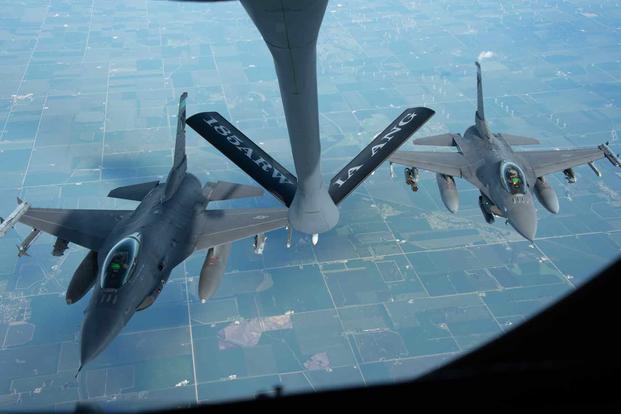The Pentagon said Tuesday that the decision to train Ukrainians on F-16 Fighting Falcon fighter jets is unlikely to aid any forthcoming counteroffensive push or immediately affect the conflict.
The department's top spokesman, Brig. Gen. Pat Ryder, said the training will take place outside of Ukraine in Europe and characterized it as an investment in the medium- to long-term capabilities of Ukraine. But he offered few other details on the newly unveiled plans during a briefing to reporters.
President Joe Biden announced to world leaders at the Group of Seven summit in Japan last week that the U.S. and its allies will begin training Ukrainians on F-16 fighter jets after months of requests from leaders in Kyiv.
Read Next: VA Can't Account for $187 Million in Emergency COVID-19 Funding
"F-16s for Ukraine is about the long-term commitment to Ukraine," Ryder told reporters at a briefing, before adding that "these F-16s will not be relevant to the upcoming counteroffensive."
Ryder told reporters that details on what the training will look like -- especially when it will start, who will provide the jets and how -- are still being worked out.
The Pentagon's chief spokesman did say that "training will take place outside of Ukraine, at sites in Europe" and that officials "hope that we will be able to start the training within weeks or months -- in the relatively near term."
When asked whether the country could expect to get deliveries of the modern jets this year, Ryder told reporters, "I don't want to put a timeline on it."
A U.S. official said Friday that it would be up to the countries that are participating in the training to decide "when to actually provide jets, how many we will provide, and who will provide them."
While Ukraine's interest in foreign fighter jets has been public knowledge since last year, U.S. officials have steadfastly maintained that, while they were considering the request, the capability would not make a major strategic impact.
Gen. James Hecker, the head of U.S. Air Forces in Europe as well as Air Forces Africa and Allied Air Command, told Military.com in March that he thought the jets would "help them a little bit" but added that "I don't think it's going to be a game changer."
Ryder said the F-16 training is considered by officials inside the Pentagon as "part of a conversation about how we support Ukraine in the mid- to long-term."
"If they are not successful in their counteroffensive, then everything else is largely a moot point," he said.
U.S. officials have followed a now-familiar pattern of publicly being hesitant to offer a suggested weapons platform, only to later give the go-ahead. Requests for weapons like the Bradley fighting vehicle, the Patriot missile air defense system, and M1 Abrams tanks all followed a similar pattern.
In the case of the F-16 jets, Ryder noted that the request was made by the Ukrainians in April 2022 and since then it was being considered by the National Security Council. Defense Secretary Lloyd Austin OK'd the plan this month.
"There was unanimous agreement that this was something that we should and need to support so, prior to the G7, Secretary Austin made the recommendation to proceed," Ryder said.
"We've said all along that we are committed to supporting Ukraine for as long as it takes, both in the near term and in the long term," he added.
-- Konstantin Toropin can be reached at konstantin.toropin@military.com. Follow him on Twitter @ktoropin.
Related: US Will Train Ukrainians on F-16 Fighter Jet After Months of Speculation













